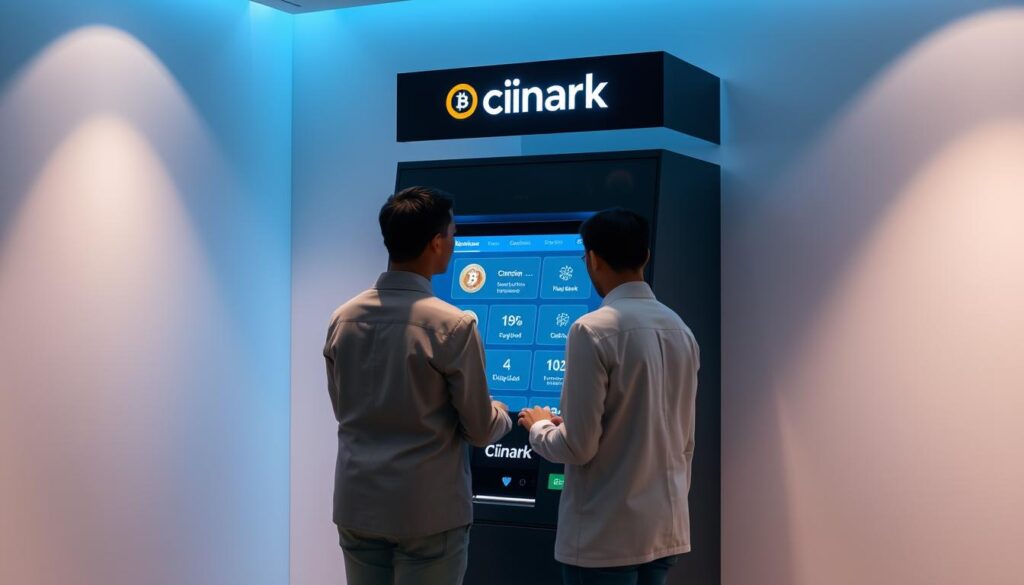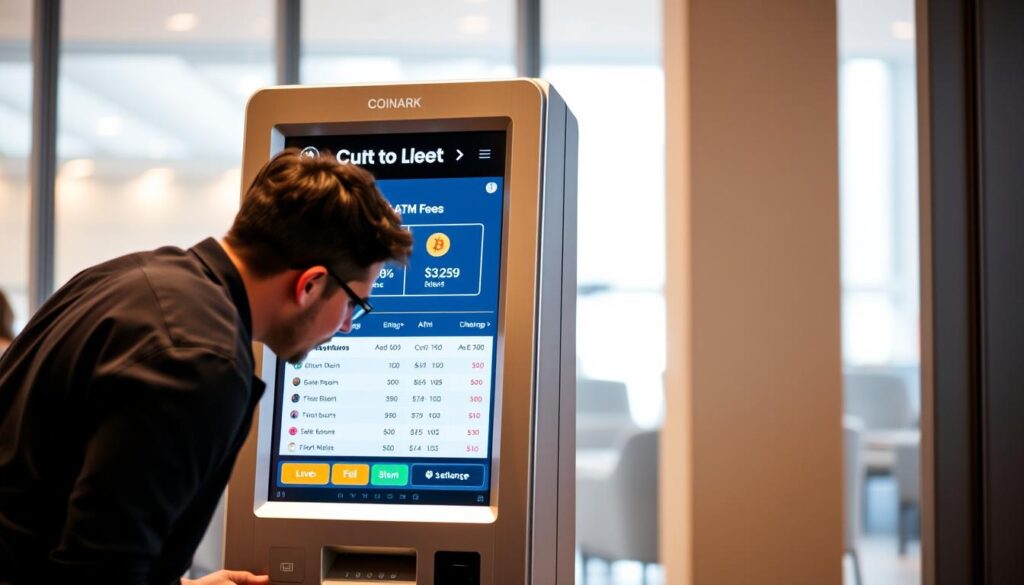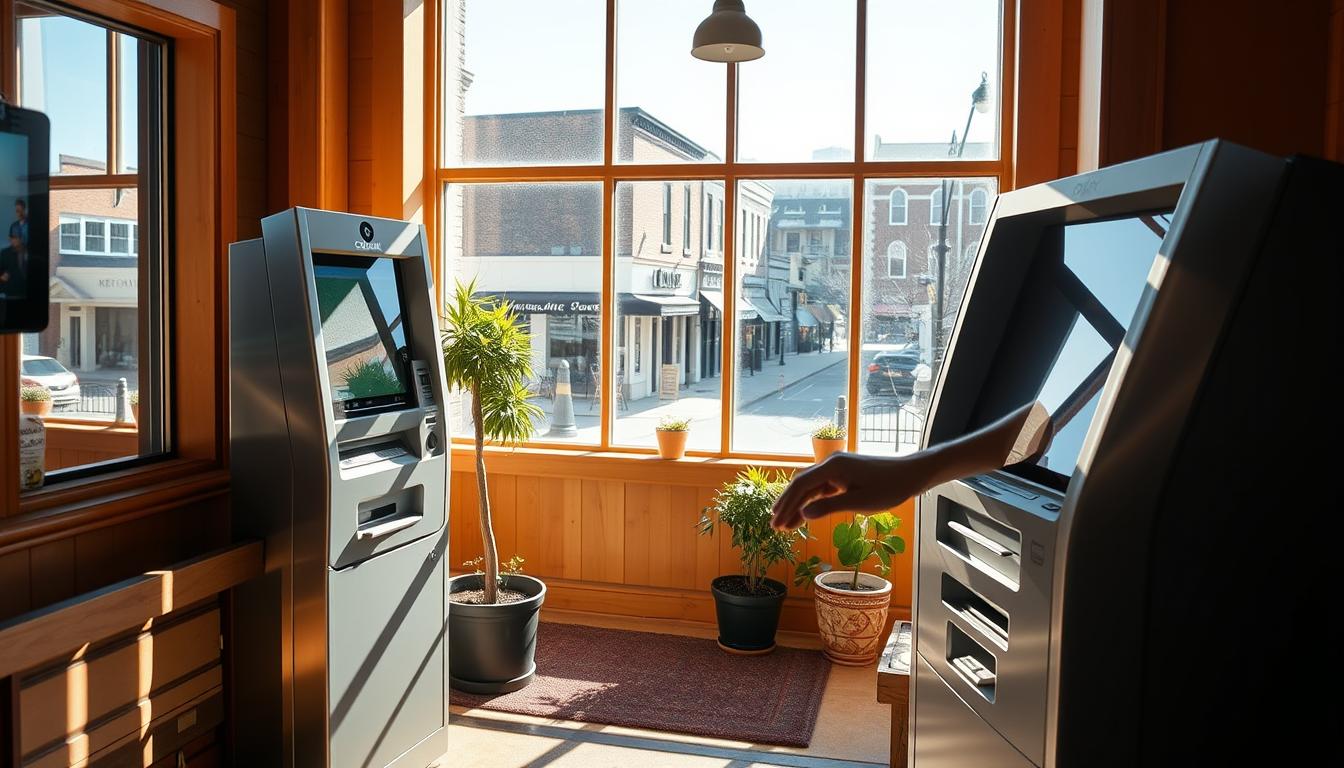Ever wondered where to quickly exchange cash for cryptocurrency without a bank? In Meadville, digital currency access is just around the corner. These kiosks bridge the gap between physical money and blockchain assets, offering a seamless way to manage your funds.
At 560 Washington St, Coinark provides a local hub for fast transactions. Unlike traditional banks, these machines operate 24/7, letting you buy or sell crypto anytime. With over 38,000 units worldwide, their popularity keeps growing.
Transactions are simple: insert cash, scan your digital wallet, and receive crypto in minutes. No lengthy approvals or middlemen—just direct access to the blockchain. Ready to explore this convenient option?
Key Takeaways
- Coinark’s Bitcoin ATM is located at 560 Washington St, Meadville
- Transactions process faster than traditional banking methods
- Available 24/7 at Sheetz and other local spots
- Over 31,000 kiosks operate across the U.S.
- FDIC insurance doesn’t cover cryptocurrency holdings
Introduction to Coinark Bitcoin ATM in Meadville, PA
Skip the hassle—convert money to crypto in minutes. Coinark’s kiosks offer a *privacy-focused* alternative to traditional exchanges. Whether you’re new to digital currency or a seasoned trader, these machines simplify the process.
Location and Accessibility
Find us at 560 Washington St. You can trade on your schedule. Need directions? Check Google Maps for real-time navigation.
Nearby landmarks include Allegheny College and downtown shops. Plus, BDCheckout™ lets you load cash at local retailers—no bank account needed.
Why Use a Bitcoin ATM?
Speed and privacy top the list. Unlike online exchanges, these kiosks don’t require lengthy verifications. Just bring:
- A smartphone with a digital wallet
- Government-issued ID
- Cash or debit card
Unbanked? No problem. These machines serve everyone, offering equal access to crypto markets. Transactions are secure, with funds sent directly to your wallet.
How Bitcoin ATMs Work Meadville, PA
Unlike bank ATMs, these units handle cryptocurrencies, not just dollars. They bridge cash and digital assets with cutting-edge tech. Let’s break down how they operate differently.
Traditional vs. Crypto Machines
Standard ATMs dispense cash linked to your bank account. Crypto kiosks transfer digital coins to your wallet using blockchain networks. Here’s a quick comparison:
| Feature | Traditional ATMs | Crypto Kiosks |
|---|---|---|
| Function | Cash withdrawal/deposit | Buy/sell cryptocurrencies |
| Transaction Time | Instant | 2–10 mins (blockchain confirmations) |
| Supported Assets | Fiat currency | Bitcoin, Ethereum, Litecoin |
How Blockchain Powers Transactions
When you insert cash, the machine creates a blockchain entry. Your wallet’s QR code ensures secure transfers. Funds move peer-to-peer, skipping banks.
For larger amounts, networks require multiple confirmations. This slows the transaction but boosts safety. Bidirectional kiosks also let you sell crypto for cash instantly.
- QR Security: Encrypted codes prevent hacking.
- Hardware: Coinark machines use tamper-proof chips.
- Speed: Faster than online exchanges—no bank delays.
Preparing to Use the Bitcoin ATM
Ready to dive into crypto? First, you’ll need the right tools. A digital wallet and understanding of QR codes are essential for seamless transactions. Let’s break it down.

Setting Up a Digital Wallet
Choose a digital wallet like Bitcoin Depot, Coinbase, or Exodus. These apps generate a unique alphanumeric address for your account. Here’s what to know:
- Public vs. Private Keys: Your public key shares your address; the private key secures access.
- Hot vs. Cold Storage: Hot wallets (online) are convenient; cold wallets (offline) are safer.
- Seed Phrases: Write it down—never screenshot it. Losing this means losing access.
Understanding QR Codes
These square barcodes link your wallet to the ATM. Open your app, tap “Receive,” and display the QR code. The machine scans it to send crypto directly to you.
Pro tip: Multi-signature wallets add extra security by requiring multiple approvals for transactions.
Step-by-Step Guide to Buying Bitcoin
Turn physical cash into digital assets in just a few simple steps. Whether you’re using bills or a debit card, the process is designed for speed and simplicity. Follow this guide to complete your first Bitcoin purchase confidently.
Inserting Cash or Using a Debit Card
Start by feeding bills into the machine—most kiosks accept $5–$100 denominations. Ensure bills face the same direction to avoid errors. For debit payments, insert your card’s chip into the reader until the screen prompts removal.
Note: Dynamic exchange rates update every 60 seconds. Verify the rate before confirming your transaction.
Entering Your Wallet Address
Open your digital wallet app and tap “Receive.” Hold your wallet’s QR code near the scanner. If typing manually, *double-check* each character—errors can’t be reversed.
Some machines support SMS verification for larger amounts. You’ll receive a code to finalize the purchase.
Confirming the Transaction
Review the amount and fees on-screen. Tap confirm to initiate the transfer. Most transactions are processed within 10 minutes, depending on blockchain traffic.
Troubleshooting tip: If your debit card is declined, try smaller increments or contact your bank for approval.
- Acceptable cash: $5, $10, $20, $50, $100 (no coins).
- Card limits: $500–$2,500 daily, based on verification.
- Receipts: Always print or email for records.
Selling Bitcoin at the ATM (If Available)
Need to convert crypto back to cash? Some kiosks make it simple. Over 65% of U.S. machines now support bidirectional transactions, letting you sell bitcoin as easily as buying it. Here’s how to navigate the process securely.
Bidirectional ATM Functionality
Not all kiosks dispense cash. Look for machines labeled “two-way” or check Coin ATM Radar for verified locations. These units scan your wallet’s QR code to initiate a transaction, then deliver funds in minutes.
Pro tip: Verify the machine’s limits before starting. Most cap daily sales at $3,000–$10,000, depending on ID verification.
Receiving Cash or Digital Transfer
Choose how you want funds delivered. Options include:
- Cash pickup: Instant but may have lower limits.
- Bank transfers: Slower (1–3 days) but higher ceilings.
| Method | Speed | Max Amount | Fees |
|---|---|---|---|
| Cash | Instant | $2,500/day | 5–8% |
| Bank Transfer | 1–3 days | $10,000/day | 3–5% |
For tax purposes, always request a receipt. The IRS treats crypto sales as taxable events, so record the transaction amount and date.
Safety first: FTC reports $65M+ scam losses in 2024. Avoid unsolicited “help” from strangers at kiosks. Double-check wallet addresses before confirming.
Bitcoin ATM Fees and Exchange Rates
Fees can make or break your digital currency experience. Whether you’re buying or selling, understanding costs ensures you get the best value. Let’s explore typical charges and how they stack up against online platforms.

Typical Fee Structures
Coinark’s kiosks charge between 8%–15% per transaction, depending on the amount. Smaller purchases often have higher percentages, while bulk deals may drop to single digits. Here’s a breakdown:
| Transaction Amount | Fee Percentage | Estimated Cost |
|---|---|---|
| $50 | 15% | $7.50 |
| $200 | 10% | $20.00 |
| $1,000 | 7% | $70.00 |
Pro tip: Fees fluctuate with network congestion. Early mornings or weekdays often offer lower rates.
Comparing Fees to Online Exchanges
Online platforms like Coinbase or Kraken charge under 1% per trade. However, they require bank links and longer processing times. ATMs win for speed but cost more for convenience.
- Hidden costs: Some kiosks include a spread markup (1%–3%) in exchange rates.
- Fee-free thresholds: Transactions over $5,000 may qualify for discounts.
- Dynamic pricing: Rates update every minute based on market demand.
Always check the screen for the final transaction amount before confirming. A $100 purchase might net $85–$95 after fees.
Benefits of Using a Bitcoin ATM
Digital currency access has never been easier. With instant transactions and no bank dependency, these kiosks offer a convenient way to manage assets. Whether you’re tech-savvy or new to crypto, the advantages are clear.
Speed and Convenience
Time matters when dealing with digital assets. Over 92% of users complete purchases in under five minutes—no waiting for bank approvals or exchange verifications. Here’s why speed wins:
- Instant funding: Cash converts to crypto in real-time.
- 24/7 access: No business hours or holiday closures.
- Minimal steps: Scan, pay, and receive—done.
“Cash transactions dominate crypto purchases, with 78% of users preferring physical money over digital transfers.” — FTC Report
No Bank Account Required
Financial inclusion matters. Over 5% of U.S. households are unbanked, yet they can still participate in the crypto economy. These machines accept cash, bypassing traditional banking hurdles.
| Feature | Bank Transfers | Bitcoin Kiosks |
|---|---|---|
| Account Needed | Yes | No |
| ID Requirements | Full verification | Partial for small amounts |
| Accessibility | Business hours | Anytime |
Local businesses also benefit. From coffee shops to contractors, many now accept crypto earned through these transactions. It’s a convenient way to streamline payments without intermediaries.
Privacy protection: Unlike banks, kiosks don’t track spending habits. Transactions stay between you and the blockchain.
Risks and Safety Tips
Staying safe with digital currencies requires awareness of common pitfalls. While crypto kiosks offer convenience, understanding scams and regulations protects your investments. Let’s explore how to trade securely.
Spotting and Avoiding Scams
Northwest Pennsylvania has seen a 150% rise in crypto fraud reports. Watch for these scams:
- Fake QR codes: Always verify wallet addresses manually.
- Reloadable gift cards: Legitimate services never demand payment this way.
- Impersonators: Avoid “helpers” offering unsolicited kiosk assistance.
Coinark’s machines feature tamper-proof cameras, but always check for skimming devices. Report suspicious activity to Meadville PD at (814) 724-6100.
Navigating Regulatory Compliance
FinCEN requires all operators to register and follow regulations. Here’s what this means for you:
- KYC/AML checks: Transactions over $3,000 require ID verification.
- BSA reporting: Large transfers trigger automated filings.
“Unverified transactions under $900 offer privacy but higher risk.” — FinCEN Advisory
Unlike bank transfers, crypto kiosks don’t share data with credit bureaus. However, the IRS treats sales as taxable events—keep receipts.
Pro tip: Use bidirectional machines from registered operators like Coinark. Their compliance ensures safety and legal transparency.
Conclusion
Exploring digital currencies just got simpler. At Coinark’s 560 Washington St location, you’ll find a quick, secure way to manage assets with cash or cards.
Remember, fees vary by transaction size—smaller purchases often cost more. Yet, 24/7 availability beats bank delays. For first-timers, we suggest testing with $20-$50 to get comfortable.
Keep your wallet secure: update apps, backup keys, and avoid public Wi-Fi during trades. Soon, Lightning Network support will slash transfer times.
Ready to start? Visit Coinark’s kiosk or contact support at (814) 123-4567. Your crypto adventure begins now!

